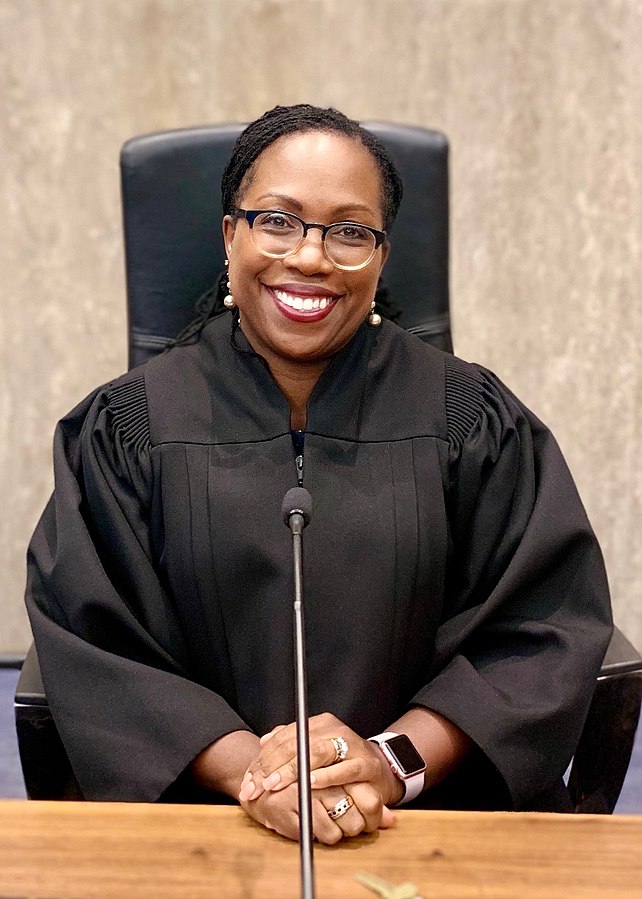U Community Reacts to Confirmation of Judge Ketanji Brown Jackson to the Supreme Court
Judge Ketanji Brown Jackson made history as the first Black woman to be appointed to the Surpreme Court on April 19, 2022
May 30, 2022
The United States Senate confirmed Judge Ketanji Brown Jackson to the Supreme Court on April 7. Jackson made history as the first Black woman to be appointed to the Supreme Court.
Jasmin Clardy, the advisor for the Black Student Union at the University of Utah, said she has felt the excitement from Black students on campus in response to seeing themselves represented “in a space of prestige and power.”
She said that although Jackson’s nomination is a small victory in the grand scheme of things, it is monumental for what it represents, which is the possibility for others to follow in her footsteps.
“It means that change can occur,” Clardy said. “[Jackson] can only do so much but if we have one set of change at the top … once we get one foot forward, that means we can take another step.”
The Supreme Court is the highest tribunal in the nation, made up of nine justices. When there is a vacancy in the court, the president can nominate someone to fill the position. The nominee must be confirmed by the Senate through a simple majority. Once confirmed, they hold the position for as long as they choose.
President Joe Biden had made a promise during his campaign to appoint a Black woman to the Supreme Court. When Justice Stephen G. Breyer announced his plans to retire in January 2022, President Biden was given the opportunity to fulfill that promise.
Mason Moore, president of College Democrats at the U and College Democrats of Utah, supported Biden’s promise to nominate a Black woman to the Supreme Court. Moore, a third-year political science student, said he felt there is a benefit to valuing the identity of a person for government roles, as it ensures the government truly represents all of its people.
“Everyone in this country has a different background, has a different perspective on the issues and if we don’t have those backgrounds and those perspectives present at every level of government, then our government isn’t going to be as effective as it could be in its mission, serving the people,” Moore said.
Clardy said another aspect of Jackson’s appointment that makes it so special is not only that she is a Black woman, but a Black woman of darker tone with dreads, which goes beyond the narrow representation that is usually afforded to Black people.
“This woman having a darker tone even still brings forth an accomplishment of sorts because typically in history, fairer skin has gotten you a type of acceptance … we want to see all of us [represented], not some of us,” Clardy said.
Jackson’s Unique Perspective
Moore said his personal reaction to Jackson’s confirmation, as well as the reaction of College Democrats at the U and across the state, was excitement.
He said the excitement came from the historic nature of Jackson’s nomination and the “win” it represented for Democrats, but also from witnessing Jackson’s personal attitude towards her job as a justice.
“It became pretty apparent in her confirmation hearings that she views her job less as espousing a judicial philosophy, like some justices do, and more about making fair and reasonable and sensible decisions,” Moore said. “And reasonable and sensible isn’t really something that we see a lot in modern politics. So it felt exciting, like a breath of fresh air.”
Prior to her nomination, Jackson served as a judge in the U.S. Court of Appeals for the D.C. Circuit and the U.S. District Court for the District of Columbia.
Another part of Jackson’s background which has made her stand out is her experience practicing as a public defender, someone who represents defendants who cannot afford to pay for a lawyer.
The unbalanced representation between former prosecutors and former defense attorneys in federal judiciary positions is a well-documented phenomenon. Jackson is the first former public defender to serve on the Supreme Court and the first former criminal defense lawyer to serve in 25 years.
Political Polarization and Criticism
Justices are expected to be unbiased, but there has been a longstanding history of U.S. presidents using their power to nominate justices who align with their political beliefs.
However, this doesn’t mean justices always vote the way people expect. Republican president Dwight D. Eisenhower would call his nomination of Chief Justice Earl Warren — who delivered the opinion on Brown v. Board of Education which made segregation of public schools illegal — “the biggest damn fool mistake I ever made.”
The confirmation of Jackson was as politically divided as ever, with three Republicans in the Senate joining Democrats to vote in favor of her nomination.
Moore was not surprised by the lack of Republican support for Jackson. He said it was not so much about the nominee and more so about the general trend of polarization across party lines.
“Honestly I would be surprised to see a nomination fight that crossed party lines,” Moore said.
Clardy felt the criticism political opponents directed at Judge Jackson during her confirmation hearings was unfair and came from a place of judgment rather than a place of actual concerns about whether she could do the job.
She felt it is also part of a broader pattern in which people of color considered for a role are expected to meet higher standards of absolute perfection to be deemed fit, referencing Vice President Kamala Harris and former President Barack Obama as other examples.
“You have to be a perfectionist because no one that looks like you has ever done this position so we can’t even depend on you unless you’re perfect,” Clardy said.
Far-reaching Impacts
Moore called the appointment of Supreme Court justices “one of the most important political processes” in the U.S.
“There is nothing that can shape the future quite like a new Supreme Court justice can,” Moore said. “They are appointed for a lifetime. Any Supreme Court nomination is absolutely critical if you’re talking politics.”
Moore said the recent leak of the Supreme Court’s draft opinion in support of overturning Roe v. Wade, a Supreme Court decision which protects the right to an abortion, highlights just how much impact the justices can have on policies.
He said justices can influence policy with their power to strike down or uphold laws on the basis of whether they are constitutional and, in cases like Roe v. Wade, set precedents for what is considered constitutional.
“In Roe v. Wade, the court upheld that we have an implicit right to privacy in the Constitution,” Moore said. “The Constitution never explicitly says that we have a right to privacy, but so many of the rights that it does outline are fundamentally predicated on privacy, that the Court said that we as Americans have a fundamental constitutional right to privacy, and that has branching effects. Their words effectively become constitutional law.”
Clardy emphasized the lasting power of Jackson’s confirmation in giving young Black people hope that their aspirations can be achieved.
“Understanding that a Black woman with dreads is now taking a public office … you can make statements like ‘I want to be Supreme Court justice, I want to be president, I want to be vice president,’ and it actually means something, and it can be done, instead of it being just words that we speak and never something that we can accomplish,” Clardy said.
Jackson is set to become a justice in late June or early July, at the end of retiring Justice Stephen Breyer’s current term.









John Hedberg • May 31, 2022 at 9:02 pm
I’m not a Republican, but I’m surrounded by people in both parties, so I hear a lot of speculation.
Trump Republicans are speculating that he may choose someone completely new as VP for his next presidential run. The name Condoleezza Rice keeps popping up, not just because of her identity check-marks, but because if anything ever happened to the President, Condi actually has the experience and background to be able to run the executive branch, even if an emergency arose. She has a background in international affairs with a Russian (Soviet) emphasis, she was the first black female National Security Advisor, and as a former Secretary of State, she’s already well acquainted with the President’s role and the people surrounding the President on the world stage. In other words, she’s well qualified to step into the shoes of President.
Currently, she heads up the Hoover Institute at Stanford, where she also teaches.
I imagine that within a generation or two, Americans won’t even notice the identity check-marks people currently find so important, because we’re constantly marrying immigrants from other nations here. There was a time when people cared whether you were English or Italian or Japanese or German, because we used to have wars with those nations. My cousin’s children have genes from all 4 of those countries, and mine come from more than 10 ethnic groups. In a generation or two, no one will be able to tell the difference anymore, and we’ll have truly reached the Mountain Top, when the content of an individual’s character is the only thing people see in each other’s faces. We’re pretty close now.
Meanwhile, it might be worth canvassing Utahns to find out how many weeks Utahns would like to keep abortion legal, since if you find that 76% of Utahns want abortion legal until 16 weeks, that means there’s a high probability of a bill with that number passing the legislature. Whatever the most popular number is, now is the time to find it, and to begin drafting bills. Abortion is not about different identity groups either, since many women are “pro-life”, many men are “pro-choice”, and a person’s feelings have nothing to do with how someone looks on the outside. Make a good argument, and pass a good law. That’s how democracy works, but the work part is always, and always will be, necessary.
We’re family. We have a chance to act like it, with increasing love & proficiency, every day, and who wants to argue against that?
Best,
J Hedberg